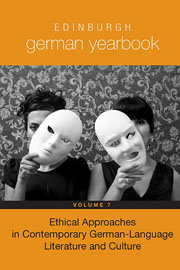 Edinburgh German Yearbook 7
Edinburgh German Yearbook 7 Book contents
- Frontmatter
- Contents
- Introduction: Ethical Approaches in Contemporary German-Language Literature and Culture
- “The Absoluteness of the Knowledge Once Possessed”: 1968 Ethics and Consensual Ethics in Uwe Timm's Novel Rot
- What the World Needs Now: Rancière, Ethology, and Christian Petzold's Toter Mann (2001) and Wolfsburg (2003)
- Materiality and Ethics in Recent German Prose Narratives by Angelika Overath and Angela Krauß
- Shameful Stories: The Ethics of East German Memory Contests in Fiction by Julia Schoch, Stefan Moster, Antje Rávic Strubel, and Judith Schalansky
- Affective Encounters and Ethical Responses in Robert Schneider's Die Luftgängerin and Sybille Berg's Vielen Dank für das Leben
- Narrative Ethics and the Problems of Age and Aging in Annette Pehnt's Haus der Schildkröten
- “So ähnlich könnte es gewesen sein, aber […]”: Unethical Narrations of Emily Ruete's “Große Wandlungen”
- Enlightenment Fundamentalism: Zafer Şenocak, Navid Kermani, and Multiculturalism in Germany Today
- Voicing Rupture: Ethical Concerns in Short Prose and Lyric Texts by Yoko Tawada
Affective Encounters and Ethical Responses in Robert Schneider's Die Luftgängerin and Sybille Berg's Vielen Dank für das Leben
Published online by Cambridge University Press: 05 December 2013
- Frontmatter
- Contents
- Introduction: Ethical Approaches in Contemporary German-Language Literature and Culture
- “The Absoluteness of the Knowledge Once Possessed”: 1968 Ethics and Consensual Ethics in Uwe Timm's Novel Rot
- What the World Needs Now: Rancière, Ethology, and Christian Petzold's Toter Mann (2001) and Wolfsburg (2003)
- Materiality and Ethics in Recent German Prose Narratives by Angelika Overath and Angela Krauß
- Shameful Stories: The Ethics of East German Memory Contests in Fiction by Julia Schoch, Stefan Moster, Antje Rávic Strubel, and Judith Schalansky
- Affective Encounters and Ethical Responses in Robert Schneider's Die Luftgängerin and Sybille Berg's Vielen Dank für das Leben
- Narrative Ethics and the Problems of Age and Aging in Annette Pehnt's Haus der Schildkröten
- “So ähnlich könnte es gewesen sein, aber […]”: Unethical Narrations of Emily Ruete's “Große Wandlungen”
- Enlightenment Fundamentalism: Zafer Şenocak, Navid Kermani, and Multiculturalism in Germany Today
- Voicing Rupture: Ethical Concerns in Short Prose and Lyric Texts by Yoko Tawada
Summary
Postmodernism has often been associated with the demise of the ethical. Conversely, the so-called “ethical turn” in contemporary literature means that literary texts are more inclined than ever to engage in ethical dialogue concerning questions of how we act toward one another. Given that encounters between human beings are contingent upon particular social and historical contexts, literature, which typically involves fictional characters interacting with each other in concrete settings, and so depicts specific actions and situations, is arguably well placed to chart a new, emerging form of postmodern ethics, one that rejects universalism and posits specificity as key to ethical behavior.
in this essay, I explore how two contemporary German-language novels negotiate particular encounters between characters: Robert Schneider's Die Luftgängerin (1998) and Sybille Berg's Vielen Dank für das Leben (2012). In spite of the fact that the novels were published fourteen years apart, the narratives' protagonists, maudi and toto respectively, have much in common. Both are intersexed; that is, their bodies exhibit what are socially read as female and male sexual characteristics. Medically speaking Toto is born with ambiguous genitalia (DL 15), whereas maudi's outwardly female appearance hides her non-descended testicles and XY chromosomes (LG 157). Yet in stark contrast to other contemporary literary texts that tell the life stories of intersexed characters and mainly focus on the protagonists'; desperate search for a gendered identity, these diagnoses are of no importance for Maudi and Toto.
- Type
- Chapter
- Information
- Edinburgh German Yearbook 7Ethical Approaches in Contemporary German-Language Literature and Culture, pp. 85 - 100Publisher: Boydell & BrewerPrint publication year: 2013


